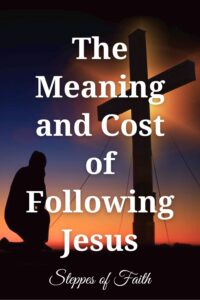
“I have decided to follow Jesus. No turning back, no turning back.” (Sadhu Sundar Singh, hymnist)
In the days following His transfiguration, Jesus and the disciples traveled through a Samaritan village on their way to Jerusalem. Many villagers rejected Him. But soon, Jesus met three men who asked to join His inner circle.
Based on Jewish culture, a student commonly chose his rabbi. Indeed, many rabbis relied on volunteers. But Luke 9 tells us Jesus did not readily accept the men. Instead, He warned them about the cost of discipleship and what He was really looking for.
In verses 57-62, the three men gathered around Jesus, and the first man said, “Lord, I will follow You wherever You go (9:57).” Jesus replied, “Foxes have holes, and birds of the air have nests, but the Son of Man has nowhere to lay His head (v58).”
Though it seems Jesus is giving a strange reply, He is trying to tell this man that he should prepare for a nomadic and homeless lifestyle. Then immediately, Jesus turns to the second man and says, “Follow Me (v59).”
Jesus dismissed the first man, but to the second man, He said, “Follow Me.” His responses did not pertain to the men’s education, experience, or any other qualifications. In both cases, Jesus looked at their hearts. Though the Bible does not tell us, it appears Jesus judged that the first man was either unprepared for such a lifestyle or not fully committed. The latter is more likely.
If we approach Jesus and ask to be a disciple, Jesus first looks at our hearts and our dedication to Him. He knows right away if we are serious about following Him. Many people have walked to the altar or prayed at their seats, silently thinking they were ready. They may have even shed tears. But sometimes, it is simply an emotional response. Many people make a claim of faith but are not serious about it. Jesus knows the difference.
These are the people Jesus refers to in Matthew 7 and what His answer will be in the last days.
“On that day, many will say to me, ‘Lord, Lord, did we not prophesy in your name, and cast out demons in your name, and do many mighty works in your name?’ And then will I declare to them, ‘I never knew you; depart from me, you workers of lawlessness’” (Matthew 7:21-2)
The first man in Luke 9:57 had such a heart. He had an interest and, perhaps, a curiosity about Jesus, but he needed more time. The man was not ready to go “all in” just yet.
Not Ready Yet
Despite the man’s hesitation, Jesus saw that the second man wanted to dedicate his life. This is why He invited the man to follow Him in verse 60. But then, the man made what seems like a reasonable request—to go home to bury his father. But Jesus tells him he cannot if he truly wants to be a disciple.
“Jesus said to him, ‘Let the dead bury their own dead, but you go and preach the kingdom of God.’” (v60)
By today’s standards, Jesus’ response to the man’s request was shocking. In ancient Jewish culture, the perception was worse. A son, particularly the eldest, was obligated to honor his parents, and burying them was the highest expression of that honor. Neglecting that duty was unthinkable. If a son did not honor his parents in their deaths, the village would permanently dishonor him, and his entire family would be ostracized.
It seems reasonable for the man to make such a request, which makes Jesus’ response seem callous and harsh. But here again, we see Jesus looking at the man’s heart.
Jewish culture dictated that a family bury their dead within one day after passing. If a man’s father had died, he would not be talking to a rabbi about disciple training; He would be home with his family preparing for the funeral. In other words, his father was not yet dead.
Delaying Jesus
The Bible does not tell us if the father’s death was imminent. Perhaps it would not come for many years. Some scholars suggest the man was referring to reburying his father, another ancient Jewish custom. A secondary burial of a father’s bones often occurred one year after the initial burial. But even if this view is true, there is no indication of how soon that first anniversary would occur.
So why did the man ask to go home to bury his father? He was politely asking for a delay. Though dedicated to Jesus, he was not truly ready for the cost of following Him.
If we want to follow Jesus and become true disciples, we must be ready to preach the Good News the moment God commands us. Additionally, we must be ready to pick up our cross daily and walk with Him (Luke 9:23), surrendering every part of ourselves to serve Him and the kingdom.
Though the man was not quite ready, this passage in Luke 9 indicates Jesus knew he would be an effective teacher of the gospel when the time was right (“But you go and preach the kingdom of God,” v60). The same is true for many of us.

No Turning Back
A third man then approaches Jesus offering to follow Him. But he, too, has a request—he wants to go home to say goodbye to his family. Again, this seems like a reasonable request. But Jesus replies,
“No one, having put his hand to the plow and looking back, is fit for the kingdom of God.” (Luke 9:62)
Jesus often preferred to teach in parables, as many rabbis did. They commonly used stories to illustrate their points. Here, Jesus refers to how the prophet Elijah met his protégé, Elisha, as a parallel to the third man’s request.
First Kings 19:19-21 describes the day Elijah called Elisha into ministry. Elijah found Elisha plowing a field with twelve oxen. The fact that he had twelve oxen tells us Elisha was wealthy. He would have to give up everything he had, including all his wealth, to follow Elijah. Understanding this, Elisha agreed, so Elijah put his robe on Elisha’s shoulders. Elisha then asked if he could delay his departure to throw a goodbye party for his parents. Elijah graciously allowed him to go.
Similarly, the third man in Luke 9 also requests to delay his departure and go home to say goodbye. Jesus does not tell him yes or no. He simply refers to Elijah and Elisha.
Every young Jewish man would have fully known the stories and ministries of both Elijah and Elisha. They would have known Jesus was referring to them, as did this young man. Knowing this, Jesus used them to illustrate His point that following Him would require much more than giving up all their wealth and adopting a nomadic lifestyle.
Following Jesus Has a Cost
Following Jesus requires much more than either Elijah or Elisha ever had to do. Becoming His disciple is far more demanding than being an Old Testament prophet. Discipleship has a cost. It involves not only spiritual training but also great personal sacrifice. We see such sacrifices today.
Some people who follow Jesus lose their families, homes, jobs, and friends. And in some parts of the world, people lose their lives. For many, following Jesus is a great risk. We see this in India, China, parts of Africa, and many other places where communities force believers to hide their faith. In other places where Christianity is acceptable, believers are still persecuted for their faith, especially politically.
Such sacrifice is what Jesus was trying to tell the third man. Based on verse 62, which begins with the word “but,” we can conclude that Jesus did not believe the man was ready to make any sacrifices. He saw the man’s heart and knew he wanted to serve, but it was not yet a high enough priority.
This is the case for many new believers. They love God and want to serve, but they have other priorities. Other things are more important, so they delay putting their faith into action. Jesus requires that we exercise our faith immediately once we choose to follow Him. He is looking for pure hearts that can produce good fruit for others to see so they are drawn to His grace.
Keep Your Eyes on Jesus
Notice in verse 62 that Jesus tells the third man that no one can put his hand to the plow and look back. Like peeling an onion, there is a second meaning here.
Israel was highly agricultural during Jesus’ time. All farmers had to plow their fields by hand. Plowing requires a person to walk behind an animal ladened with plowing blades and steer the animal in a straight line. If one takes his eyes off what is ahead to look over his shoulder, the plowed rows would not be in straight lines, i.e., they would all be wavy, and one would have to start over.
If we want to follow Jesus, we must keep our eyes forward. We cannot keep looking backward to where we once were. We cannot keep going back to old habits and haunts. To do so would mean we have not truly chosen to follow Jesus (see Matthew 7:21-23).
Consider what happened to Lot’s wife. An angel told her and Lot to run away from Sodom and Gomorrah and not look back while God destroyed the cities. Lot’s wife looked back anyway. Most scholars believe she did not simply glance but ran back to the city only to get caught up in the destruction (Genesis 19:1-26). Her decisions and actions illustrate sin’s power and its consequences.
This is not what God wants for us. Instead, He calls us to be plowmen. We must keep our eyes on Him, always moving forward in service to Him, never looking to the left or right, and never returning to where we have been. Death and destruction lie where we come from, but light and eternal life lies ahead for those who wholeheartedly choose Jesus.
“And your ears shall hear a word behind you, saying, ‘This is the way, walk in it,’ when you turn to the right or when you turn to the left.” (Isaiah 30:21)

True Transformation
The three men in Luke 9 show that Jesus seeks people with truly transformed hearts. Consider Jesus’ parable of the sower in Matthew 13, Mark 4, and Luke 8.
Jesus compares the word of God to a farmer spreading seeds in a field. Some seeds fall by the wayside and never sprout roots because Satan snatches them away. Others fall on rocky soil and grow shallow roots but ultimately die. Still, others fall among the thorns, where they attempt to take root but are overtaken by life’s pleasures.
But thankfully, some seeds fall on good soil and take solid root. Jesus says those are the ones who hear His word “with a noble and good heart, keep it, and bear fruit with patience.”
God is looking for disciples with noble and good hearts who accept His word and act on it. Of the three men who approached Jesus to be a disciple, notice He only somewhat accepted one of them. It is not that He did not want them; they were not ready to bear the cost of discipleship.
True discipleship does not mean simply being open to teaching. Discipleship requires risk and sacrifice. It requires a truly transformed heart willing to surrender to whatever God calls one to do. It requires someone who seeks His kingdom and righteousness daily (Matthew 6:33). And it requires someone who routinely and purposely produces good fruit (Galatians 5:22-23). A true disciple has these outward expressions of true transforming faith.

I have recently discovered. In ancient Egypt Heka is the father, the son and the spirit. He is always with Sia and Hu. Sia is the egyptian god of the heart that gives us perception. The bible talks about the giving us perception over 800 times. Sia in hebrew is selah and is in the bible 74 times. The bible tells gods true name 3 times. Once as Adonai Hu lord Hu. Hu is the egyptian god of utterance the spoken word. The bible talks of the word of god over a thousand times. Once as ropeheka the healer Heka. The bible talks of god healing others hundreds of times. And once as YHWH which is hebrew for HUWA which is Arabic for Hu. The bible says look to the stars for the creator god. It say 4 times look from pleiades to taurus to orion. There is a star in orion called Heka. Jesus says he is the lucifer which is hebrew for morning star. Orion is the morning stars. People think it’s venus but everyone knows venus is a planet not a star even the ancient egyptians knew this. That’s why the giza pyramids are aimed at orion and the star called Heka. Orion can be seen in the early mornings.
I can go on and on. Lol
That’s all very interesting, Ronald, but it all seems a stretch to find meaning where none exists. I don’t know much about Egyptian religion, other than it’s a pagan religion, but I do know YHWH is not Hebrew for HUWA. YHWH is a tetragrammaton (an acronym for lack of a better way of saying) for Yahweh. It is not based in anything Egyptian. Also, the only name God tells us for Himself is “I AM.” Nowhere in the Bible does it say it is “Adonai,” which is a Hebrew term for “master” or “lord.” It is implied, but it is not specifically stated. And this is also very important…Jesus did not say He is Lucifer, the fallen angel we now refer to as Satan. Please do not make that equivalent! Lucifer does mean “Morning Star,” indicating what his heavenly position was before he rebelled against God, but that is not Jesus. Jesus is holy, Satan is not (by a lot!). So, if the pyramids are pointing towards some kind of morning star, it doesn’t sound like it’s Jesus. I’m sure it was interesting reading, but please be careful. False teaching is rampant these days.
As I understand morning star or Lucifer cant compare to Jesus christ because jesus is the word of God who came to us in the world to save us. Lucifer is angel who made sin against God. So clearly their both cant compare. Name Adonia is another name of our God in this world as Hebrew made so many name but we believed there is one God only and Trion is shown as the Father, Son and Holy Spirit. If many confused of knowing the truth about the word of God, then their not clearly understanding the word of God! For me it’s TRUE that without acknowledging the Holy Spirit before reading the word of God can’t understand it well.